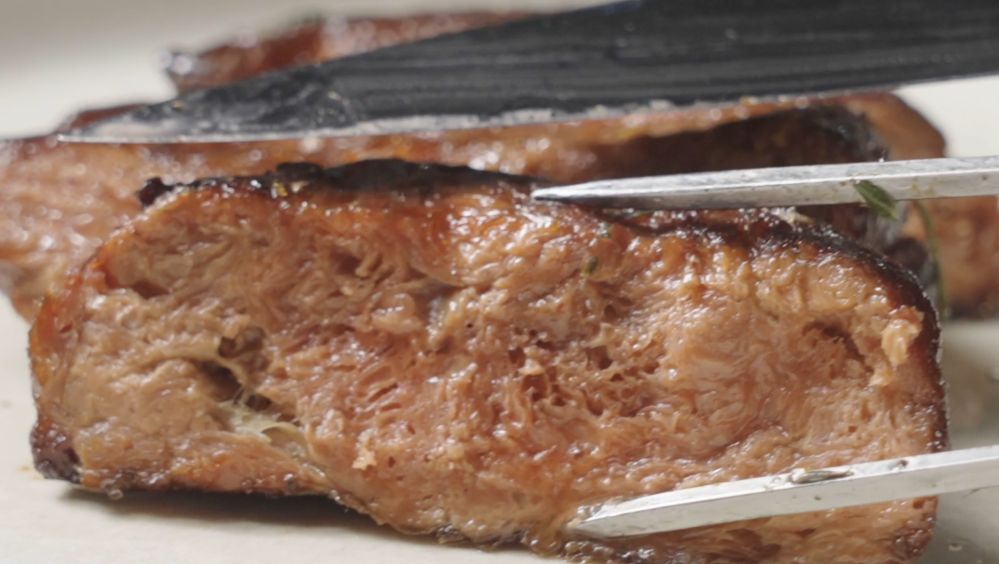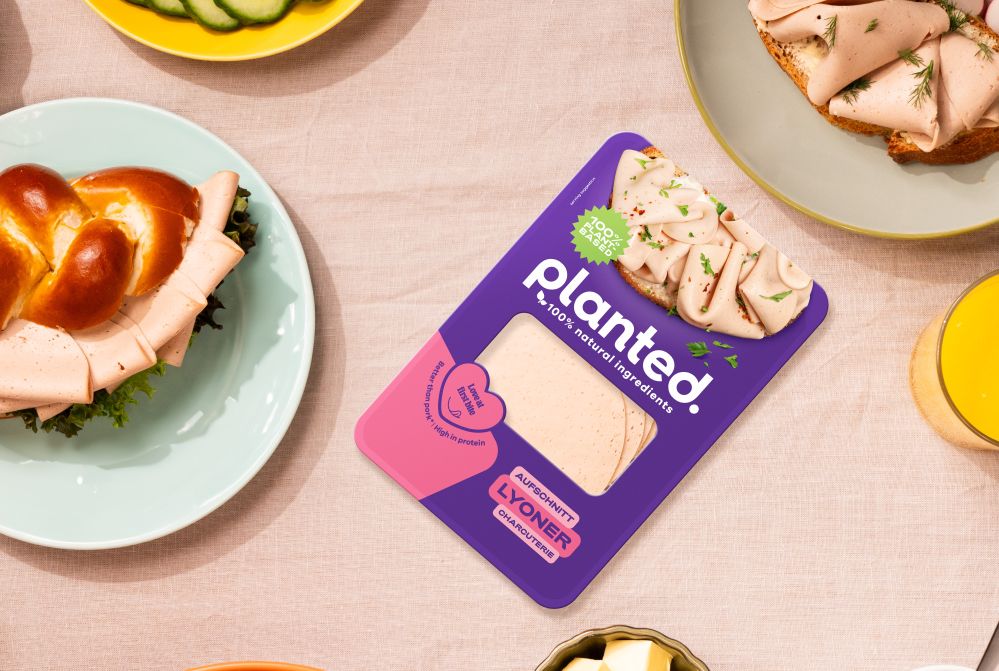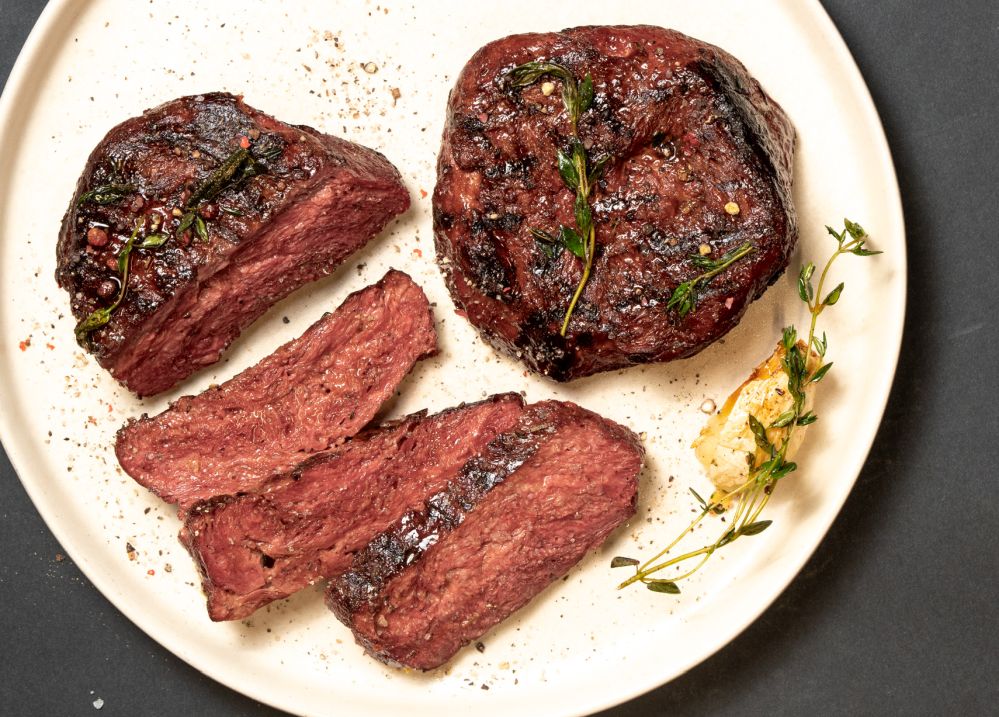Swiss plant-based meat startup Planted has made a multimillion-dollar investment in fermentation capabilities creating 30 new jobs at its manufacturing plant in Kemptthal, Switzerland, as it ramps up production of its latest product: a beef fillet steak from plants.
Planted is one of several players making ‘whole cut’ meat alternatives, from Slovenia-based Juicy Marbles [disclosure: AgFunderNews’ parent co AgFunder is an investor] to Israel-based Chunk Foods; Indonesia-based Green Rebel Foods; Germany-based Project Eaden; US-based MyForest Foods, Meati Foods, and Mooii Meats; France-based Umiami; and Spain-based Novameat.
Zurich-based Planted, which currently uses high-moisture extrusion to make plant-based chicken, pork, and duck products in Kemptthal, is deploying a “proprietary solid-state fermentation process” to make its beef steaks, said a spokesperson: “We build our own fermenters as well as upstream and downstream equipment. We have filed and continue to file patents around this new technology.”
Planted, which has raised CHF115 million ($131 million) to date from backers including L Catterton and Tengelmann Ventures, recently soft launched its steaks in 25 restaurants in Switzerland, Germany, and Austria and will further expand “across DTC channels as well as in retailers across Europe in 2024.”
The “juicy” and “tender” steaks combine soy protein, bean and rice flour, rapeseed oil and a “proprietary blend of microbial cultures” to create a high-protein, high-fiber, low-saturated fat product with iron and vitamin B12, cofounder and CEO Pascal Bieri told AgFunderNews: “We’re growing the product in a fermenter for 30-40 hours.”
Per 100g, the steak contains 182 calories, 17g protein, 5.8g fiber, 0.9g saturated fat, 25% of the RDA for iron, and 72% of the RDA for vitamin B12, says the firm, which was awarded CHF2 million ($2.3 million) by the Swiss government-backed innovation agency Innosuisse last year to develop its whole muscle platform.

Multiple touch points for the Planted brand
According to CEO Pascal Bieri, Planted is “the leading brand here in Switzerland and number two in Austria, in the top 10 in Germany, and in the top five in Italy.”
Asked about market dynamics in the plant-based category in Europe, he said: “I’d say the UK is maybe the most similar to the US in that we’ve seen some stagnation in the category in the last few years. I think what happened was that big companies and traditional protein companies came in without caring too much about product quality and repurchase rates weren’t good.”
Retail buyers are now being more cautious about what they put on the shelf, which is a good thing, claimed Bieri, who said Planted has generated “strong growth” in revenues over the past year, with a fairly even split between retail and foodservice.
“I feel like buyers are a bit more hesitant now,” he said. “They don’t jump on anything that moves and they really want to understand how you are going to support your brand and have in-depth conversations about growing the category. But the list of new retail listings coming up for Planted in the Netherlands, France, Italy, Germany and the UK is incredible.”
He added: “The fact we have a presence in foodservice helps [conversations with retail buyers]. We’re in more than 8,000 foodservice outlets in Europe including some high-profile transit locations, so we have multiple touchpoints for the consumer. So for example Deutsche Bahn in Germany has three of our items on its menu; that’s high-visibility because people spend a lot of time on trains.”

Test and learn in foodservice before launching in retail
Planted continues to test new products in restaurants so it can rapidly respond to feedback before launching products into retail, said Bieri.
“We’ve always worked this way. When we started we were selling our chicken in foodservice channels and we were approached by [leading Swiss retailer] Coop. Shortly after that COVID hit and basically all of our restaurant customers were temporarily out of business, but we were able to scale through Coop. And then we launched into Migros in Switzerland Edeke in Germany, and Spar in Austria, and it just grew from there.
“But we kept on building our foodservice relationships throughout the pandemic, and today we have a foodservice sales force in all of our markets including Italy, France, Benelux and the UK.”
The aim is to ‘beat the price of organic meat’
Asked about the unit economics of plant-based meat production, he said handling all parts of the process in one location in Kemptthal helps keep costs down, while economies of scale are also helping improve margins.
“In the early days we were making about a ton a day through extrusion, now we’re making about 15 tons a day. We’re also scaling up the steak production so we can do multiple tons a week.”
On pricing, he said, the aim in each market is “to beat the price of organic meat.”
Sustainability not a key purchase driver for shoppers: ‘I think consumers are tired of hearing about it’
As for marketing, said Bieri, different dynamics are at play in each market in which Planted operates. However, health is consistently “the most important topic” that resonates with consumers, coupled with the firm’s clean label message. Notably, its original chicken product has just six ingredients: water, pea protein, pea fiber, rapeseed oil, salt, and vitamin B12, he said.
“This is something we’ve been insistent about from the beginning. We won’t use ingredients like methylcellulose or additives. I remember in the early days we wanted to make our chicken white so we tried adding titanium dioxide like everyone else to make fantastically white-looking chicken. But ultimately we refused to take that shortcut. We had to find another way.”
Animal welfare and the environment are not key purchase drivers in most markets, noted Bieri. “They are important to us, but honestly I think consumers are tired of hearing about this. We have to use a different argument.”





